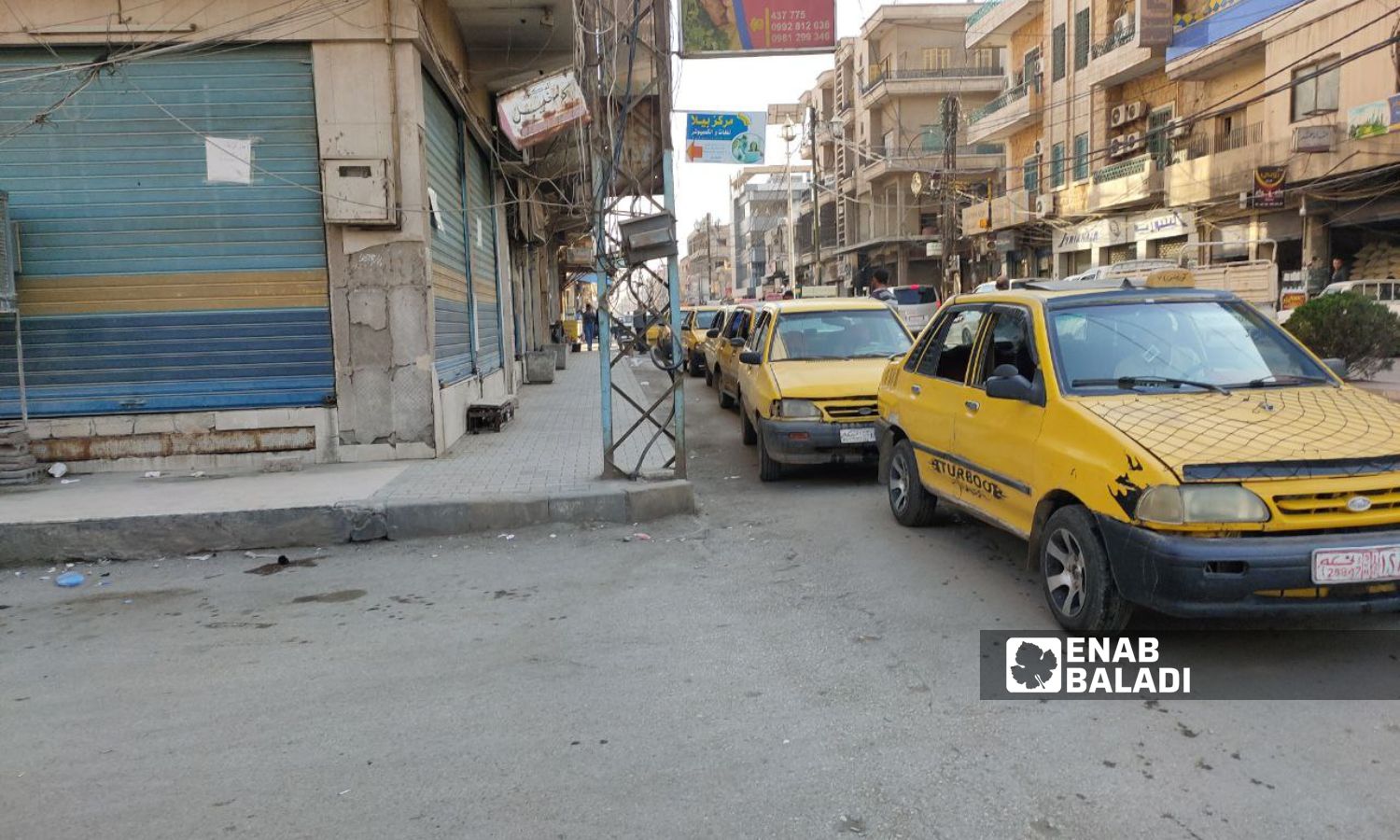



Al-Hasakah – Majd al-Salem
After five months of buying a taxi as a source of income for his family of four, Fahd al-Hussein, 37, from the city of Qamishli in al-Hasakah, decided to give up the idea of working on it.
Al-Hussein told Enab Baladi that he had put his vehicle at a car trading office in the city for about a month and that he is ready to sell it even if there are some losses because working as a taxi driver has become a losing project due to the “expensive” increase in maintenance and repair costs, spare parts, and others.
Al-Hussein works from morning until evening, and sometimes at night, and can earn a sum of 100,000 or 150,000 Syrian pounds in a single day (every dollar is equivalent to 14,250 pounds).
He explained that a sudden malfunction costs at least 50 dollars, if the driver is lucky, to spend all the money earned during the week on maintenance fees for repair shops and spare parts and fuel.
He pointed to another problem, which is the variation in spare parts prices between one store and another, with lack of credibility in dealing, as some parts claimed by store owners to be original (Korean or Japanese) are found to be “imitation” after installation.
Al-Hussein likened the industrial area in Qamishli to a “slaughterhouse” and a place for “robbery,” especially if the driver is new to the profession and does not know how to deal with store owners and repair shops, pointing out that he will be exposed to “fraud and deception,” and selling parts at “high” prices, with no oversight on spare parts store owners and repair workshops except for their “conscience.”
Omar al-Kayrit, 46, owns a Saipa-type taxi that looks old and dilapidated and operates on the Corniche line in Qamishli, said to Enab Baladi that most of the taxis operating on the line are of this type and are preferred by drivers even though they are old because spare parts are available for them and cheaper than modern cars that would be impossible to generate income if used as taxis.
Al-Kayrit added that some modern cars become very old and dilapidated, to the extent that a day cannot pass without a breakdown, forcing their owners to exit the labor market.
He mentioned that the fare for one passenger is 1500 Syrian pounds, and the car capacity is five passengers, and the driver gets 7,500 Syrian pounds on each trip, and in one day the amount may reach 75,000 Syrian pounds, so if the fuel costs are calculated, the driver will not have anything left to secure his family’s livelihood in the event of an emergency breakdown.
According to what Enab Baladi has observed, some taxis are operated by drivers who receive a quarter of the income from the original car owner (25% of the daily income), and in these cases, the suffering of the car owner is greater in providing spare parts for his car and securing maintenance for it at the lowest prices.
As a result of the “large number of disabled cars”, some car owners wait for days to get a turn at the mechanic, which means depriving them of income throughout these days.
Anas al-Hajj, 39, owner of a store selling car spare parts, told Enab Baladi that there is no law to determine the prices of spare parts, especially the used European parts that enter the area through the Semalka crossing from northern Iraq or from Manbij, which in turn comes from Turkey through the opposition-controlled areas.
He added that all car parts are sold in dollars, and the condition of the part controls the price, whether it is new or used and according to its technical condition, country of origin, and car brand, and the prices of spare parts range between ten dollars and 300 dollars, depending on the type of part.
In general, the newer the car, the more expensive its parts are, and replacing a mirror of a modern car or its lights may cost 100 dollars for each part, and a pair of tires may cost from 50 to 100 dollars, according to the mechanic.
Al-Hajj said that owners of car spare parts stores often buy what are known as “cuts” (European cars cut in the middle and suitable for use as spare parts only), and the cost of transporting and fees increases the prices of spare parts.
He explained that the fees of the Autonomous Administration’s crossings are paid by the ton, so every ton of the weight of the cargo costs about 700 US dollars.
Amer al-Jallo, owner of a maintenance workshop in Qamishli, told Enab Baladi that workshop owners face difficulties in securing spare parts at reasonable prices, and this greatly affects the services they provide to customers, pointing out that the drivers feel the financial pressure due to this increase, and cannot bear the additional costs.
He added that he prefers not to provide spare parts to any customer himself but asks the car owner to secure the parts he needs for repair and maintenance, so the matter depends on the “ingenuity of the customer” in securing parts for his car at cheap prices from any store he chooses, and the workshop owner takes only the labor fee.
Regarding the frequent malfunctions, al-Jallo told Enab Baladi that the main reason is the poor quality of diesel and gasoline used, which causes many problems for the engine, and then comes the poor technical condition of the roads full of pits, cracks, and bumps that lead to damaging the car.
Regarding the cost of disassembling and installing the engine, he said that it costs between 300 and 500 US dollars because the cost of labor is high, as well as the taxes and fees paid to the municipality.
if you think the article contain wrong information or you have additional details Send Correction